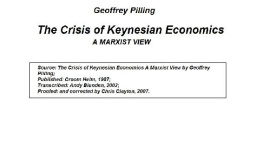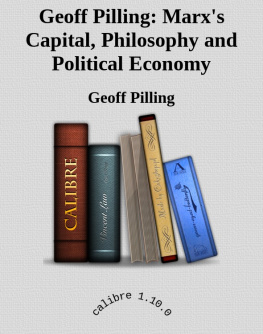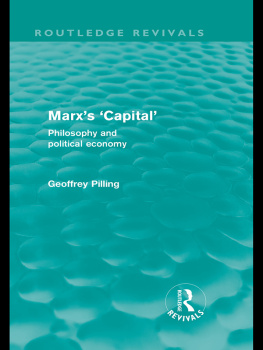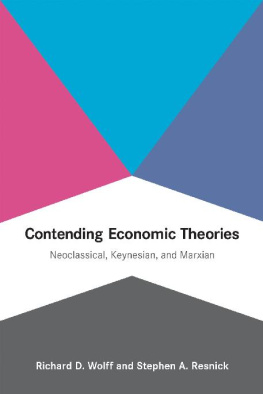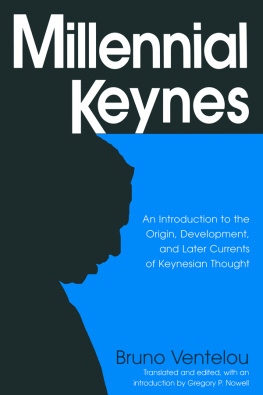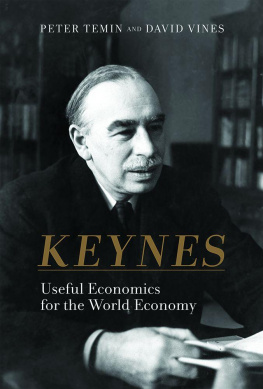Geoffrey Pilling - The Crisis of Keynesian Economics
Here you can read online Geoffrey Pilling - The Crisis of Keynesian Economics full text of the book (entire story) in english for free. Download pdf and epub, get meaning, cover and reviews about this ebook. genre: Politics. Description of the work, (preface) as well as reviews are available. Best literature library LitArk.com created for fans of good reading and offers a wide selection of genres:
Romance novel
Science fiction
Adventure
Detective
Science
History
Home and family
Prose
Art
Politics
Computer
Non-fiction
Religion
Business
Children
Humor
Choose a favorite category and find really read worthwhile books. Enjoy immersion in the world of imagination, feel the emotions of the characters or learn something new for yourself, make an fascinating discovery.
- Book:The Crisis of Keynesian Economics
- Author:
- Genre:
- Rating:5 / 5
- Favourites:Add to favourites
- Your mark:
- 100
- 1
- 2
- 3
- 4
- 5
The Crisis of Keynesian Economics: summary, description and annotation
We offer to read an annotation, description, summary or preface (depends on what the author of the book "The Crisis of Keynesian Economics" wrote himself). If you haven't found the necessary information about the book — write in the comments, we will try to find it.
The Crisis of Keynesian Economics — read online for free the complete book (whole text) full work
Below is the text of the book, divided by pages. System saving the place of the last page read, allows you to conveniently read the book "The Crisis of Keynesian Economics" online for free, without having to search again every time where you left off. Put a bookmark, and you can go to the page where you finished reading at any time.
Font size:
Interval:
Bookmark:
Geoffrey Pilling
A MARXIST VIEW
....................................................
.......................
This book is a Marxist critique of certain aspects of Keynesianism. Whilst it concentrates on a review of Keynes writings rather than the vast literature which has grown up amongst his followers over the last 40 years and more, it does pay some attention to the work of the left Keynesians and in particular that of Joan Robinson. The fact that Keynesianism is manifestly in a crisis provided the opportunity to reconsider the nature of Keynes contribution both to economic theory and economic policy. Many of the issues involved in such a review are perhaps now much clearer than they were in the long period after the war when Keynesianism ruled almost unchallenged in both the academic world as well as amongst the formulators of state economic and social policy.
Although written over a relatively short space of time, the themes of the book have concerned the author for some time. They arose in part from the fact that much of what passed for a Marxist treatment of Keynes was not only highly unsatisfactory but at the most fundamental level constituted a capitulation to the prevalent Keynesian orthodoxy. No doubt this unsatisfactory state of affairs had its roots in developments in the Soviet Union during the period in which Keynesianism first emerged and then gained a firm grip on the academic world. See Letiche (19171) for Soviet reactions to Keynes; they veered between a writing-off of his work as simply bourgeois to serious concessions to his conceptions. As far as the Anglo-Saxon world is concerned, little attempt was made at a serious analysis of Keynesianism and this again can be attributed to the deleterious effect which Stalinism had on the development of Marxism over a long period. Some of this work is reviewed in what follows.
Yet for Marxism Keynesianism represented, and still represents, a serious challenge. In the first place it claimed to have resolved the fundamental problems of capitalism and to have provided the tools to put an end to capitalist crisis for good. More specifically, Keynes claimed to have dealt a deadly blow to Marxism, in particular to have knocked away its foundations which he saw as lying in the work of Ricardo. As such, Keynesianism became the ideology for various reformist currents in the working class, as well as for those who wished to pronounce Marxism in need of updating to take account of the new phenomena of modern capitalism (if indeed, post-Keynes, that term retained any meaning). It is true that the first claim, like reports of Mark Twains death, can now be seen as perhaps somewhat exaggerated; as to the second claim, it rested essentially upon Keynes ignorance of Marxism in general and of the latters critique of political economy in particular. But to leave the matter there would be a mistake, if only because Keynesianism still retains a certain hold in sections of both the working class as well as amongst the intelligentsia. The programme of the Labour Party and TUC leadership put forward to deal with the current crisis (the so-called Alternative Economic Strategy) is essentially Keynesian in outlook, calling for the expansion of government expenditure as the means to cure a situation of chronic unemployment.
The book which follows is directed at those interested in Keynesianism and more generally in current questions of economic theory and policy. On a wider level though, it is written from the point of view that the development of Marxism takes place only in the systematic confrontation with all forms of bourgeois theory. It is not only inadequate merely to defend the integrity of Marxism in some formal sense: such a procedure must inevitably lead to dogmatism and sterility and ultimately to the abandonment of Marxism itself. There is no doubt that those many claiming to be Marxists who saw in post-war capitalism the opening-up of a new, essentially crisis-free phase in its development, drew their essential conceptions from Keynes locker, even though their theories were clothed in Marxist-sounding terminology. In this camp I would certainly include those who saw in expenditure on armaments one of the principal instruments for capitalist stability. Under the same rubric can be placed those theories of neocapitalism which regarded the state as playing a decisive stabilising role in present-day capitalist economy.
These attempted revisions of Marxism involved by no means merely details of economic theory, but extended to the decisive questions of the Marxist world outlook and in particular its basic conception of the capitalist mode of production. It is for this reason that in considering Keynes work I have concentrated on these issues.
Part of the contents of the book formed the basis for seminars in Middlesex Polytechnic in the academic year 1984-85 and I thank the students who participated in those discussions. I should also like to thank Len Gomes for the use he allowed me to make of his wide-ranging knowledge as well as for some helpful references in connection with Chapter 5. I make the statement, usual in these matters, that I alone am responsible for what follows.
The following abbreviations have been used throughout the book:
Capital, vol. I (Lawrence & Wishart, London, 1961)
Capital, vol. II (Lawrence & Wishart, London, 1961)
Capital, vol. III (Lawrence & Wishart, London, 1961)
Th I, Th II, Th III Theories of Surplus Value, Parts 1-3, (Lawrence & Wishart, London)
J.M. Keynes, The General Theory of Employment, Interest and Money (Macmillan, London, 1936)
JMK CW: The Collected Writings of John Maynard Keynes (Macmillan, London)
LCW: The Collected Works of Lenin (50 vols) (Lawrence & Wishart, London)
MECW: The Collected Works of Marx and Engels (Lawrence & Wishart, London)
DR: The Works of David Ricardo, ed. Sraffa, Cambridge University Press, Cambridge
There are still echoes of the debate, now well past its centenary, between Marxists and neoclassical economists, but not much of this is heard anywhere in professional circles, and there is certainly very little in it to exercise the general body of economic practitioners. Economics seems, miraculously, to have ceased to be the battleground of conflicting ideologies. As we shall see, there are many and sometimes very profound differences of view on particular issues, especially where specific points of economic policy are concerned. But, while it may be going too far (paraphrasing Sir William Harcourt) to say we are all Keynesians now, it seems that in our analytical moments most economists are prepared to take the innovations of Keynes and his disciples for granted. (Roll 1968: vi-vii)
Virtually everybody is prepared to agree that a deep malaise now afflicts the once seemingly omnipotent Keynesian political economy. Many are of the opinion that we have already seen the end of the Keynesian era. But there is little agreement amongst orthodox economists about the nature of this illness, its origin and the means to its cure, assuming that it is not in fact terminal. This book attempts, from a Marxist standpoint, to examine various facets of the crisis pervading Keynesianism and thereby provide a critique of Keynesian economics. This it does because, however severe their predicament, Keynesian ideas still retain an important influence, not least in the British labour movement. Thus in the so-called Alternative Economic Strategy proposed by the Trades Union Congress and others in opposition to the economic policies pursued by the Thatcher governments since 1979 a large element of Keynesianism is clearly visible. This opening chapter surveys this crisis, outlines several reactions to it from economists and others, and in so doing sketches out the major themes of the book.
Font size:
Interval:
Bookmark:
Similar books «The Crisis of Keynesian Economics»
Look at similar books to The Crisis of Keynesian Economics. We have selected literature similar in name and meaning in the hope of providing readers with more options to find new, interesting, not yet read works.
Discussion, reviews of the book The Crisis of Keynesian Economics and just readers' own opinions. Leave your comments, write what you think about the work, its meaning or the main characters. Specify what exactly you liked and what you didn't like, and why you think so.

